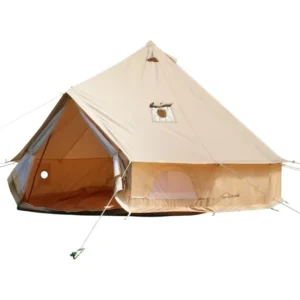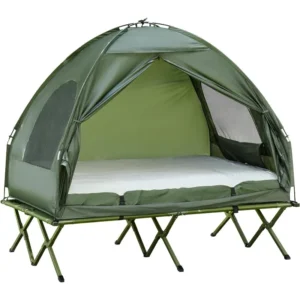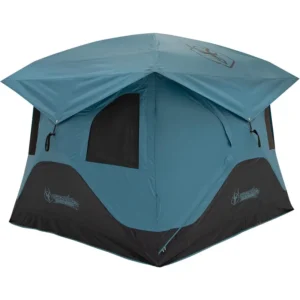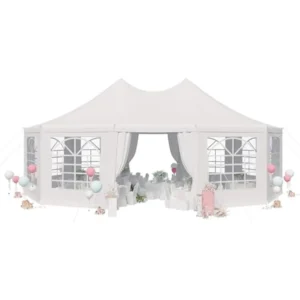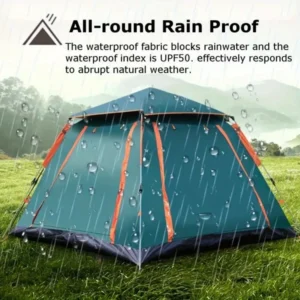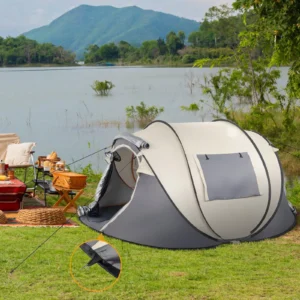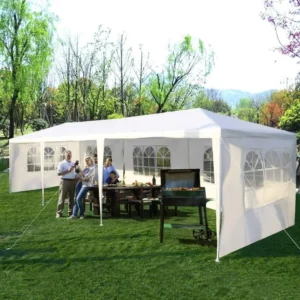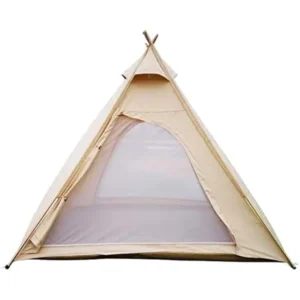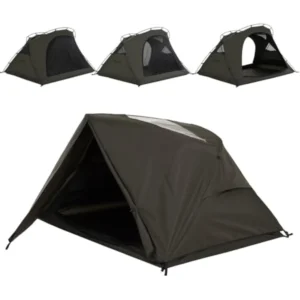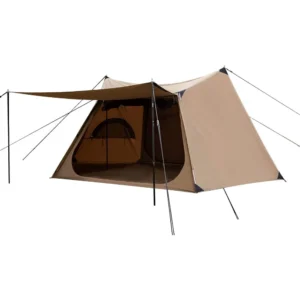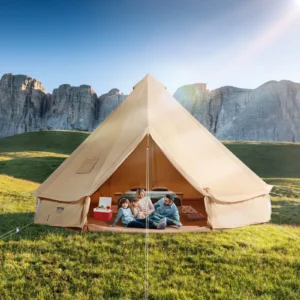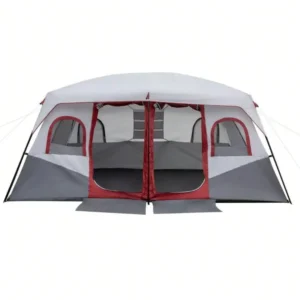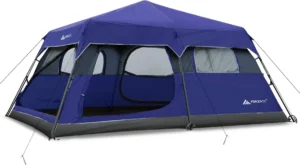Canvas Camping Tent
Want a tent that lasts and breathes? Canvas camping tents offer robust durability and natural comfort in any weather. Create unforgettable outdoor memories for years.
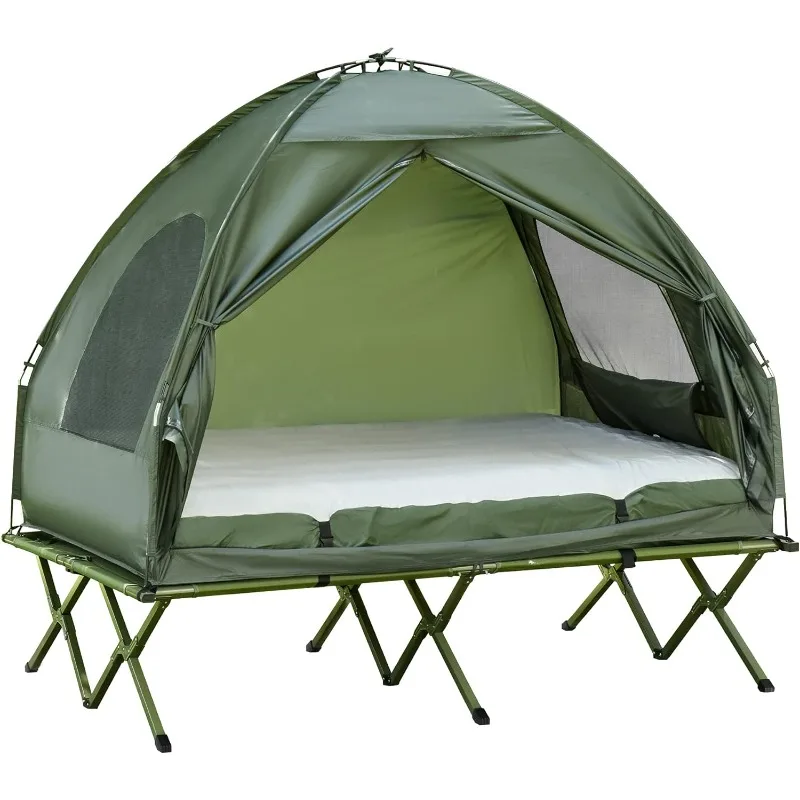
Showing 1–12 of 15 results
Canvas Camping Tent, Heavy Duty 4 Season Tent, Winter Camping Tent
$1,220.06 Select options This product has multiple variants. The options may be chosen on the product pageCanvas Camping Tent, Easy Setup Camping Tent
$490.82 Select options This product has multiple variants. The options may be chosen on the product pageCanvas Camping Tent, Dome Camping Tent, Waterproof Camping Tent
$1,056.55 Select options This product has multiple variants. The options may be chosen on the product pageCanvas Camping Tent, Easy Setup Camping Tent, Waterproof Camping Tent
Portable Aluminum Frame 2-Person Camping Tent with Double Ventilation Windows for Outdoor Adventures$220.45 Select options This product has multiple variants. The options may be chosen on the product pageCanvas Camping Tent, Pop Up Dome Tent, Waterproof Pop Up Tent
$227.66 Select options This product has multiple variants. The options may be chosen on the product pageCanvas Camping Tent, Waterproof Camping Tent
$443.04 Select options This product has multiple variants. The options may be chosen on the product pageCanvas Camping Tent, Waterproof Camping Tent
Premium Bell Canvas 2-Person Pyramid Tent with Waterproof Cotton for Glamping and Outdoor Adventures$489.84 Select options This product has multiple variants. The options may be chosen on the product pageCanvas Camping Tent, Waterproof Camping Tent, Winter Camping Tent
$836.57 Select options This product has multiple variants. The options may be chosen on the product page- $1,221.93 Select options This product has multiple variants. The options may be chosen on the product page
Canvas Camping Tent, Two Room Camping Tent, Waterproof Camping Tent
$630.73 Select options This product has multiple variants. The options may be chosen on the product page
Showing 1–12 of 15 results
Why Choose Canvas Camping Tents: The Superior Outdoor Experience
Canvas camping tents represent the pinnacle of outdoor shelter technology, drawing on centuries of traditional camping heritage. Unlike modern synthetic alternatives, canvas offers a premium camping experience that connects you with nature in a way that mass-produced tents simply cannot match. These robust shelters provide exceptional durability—often lasting 10+ years with proper care—while creating a uniquely comfortable space that feels like a true home in the wilderness.
What makes canvas truly special is how it breathes with the environment around you. The natural fibers regulate temperature, minimize condensation, and create a quieter, more peaceful shelter regardless of weather conditions. This traditional material delivers modern performance that discerning campers recognize as worth the investment.
At Explore Elements, we’ve curated a collection of premium canvas tents that have been rigorously tested in diverse environments. In the sections that follow, we’ll guide you through everything you need to know about these exceptional shelters, from material science to practical maintenance tips that ensure your canvas tent becomes a trusted companion for countless adventures.
Understanding Canvas Tent Materials: What Sets Them Apart
Canvas tents are crafted from tightly woven natural cotton duck or poly-cotton blends, creating a robust fabric that outperforms synthetic alternatives in key areas. The fabric’s weight, measured in ounces per square yard, typically ranges from 10-15oz—with heavier weights offering enhanced durability and weather resistance. Quality canvas undergoes specialized treatments for waterproofing, UV protection, and mildew resistance without compromising the material’s natural breathability.
What truly distinguishes canvas from synthetic materials is its performance across multiple dimensions that matter to serious campers:
| Feature | Canvas Tents | Synthetic Tents |
|---|---|---|
| Durability | Superior (5-15+ years) | Moderate (2-5 years) |
| Weather Resistance | Excellent when treated | Good but deteriorates |
| Breathability | Natural breathability | Requires ventilation systems |
| Insulation | Superior temperature regulation | Poor insulation |
| Weight | Heavier (20-80+ lbs) | Lightweight (5-15 lbs) |
| Noise Level | Quiet in wind/rain | Noisier during weather |
| Price Point | Higher initial investment | More affordable |
| Maintenance | Requires proper care | Less maintenance |
Contrary to common misconceptions, modern canvas tents are not inherently prone to leaking or mildew. When properly treated and maintained, they provide superior weather protection while maintaining their breathability advantage. The initial investment pays dividends through extended lifespan, enhanced comfort, and versatility across seasons and conditions that synthetic materials struggle to match.
Canvas Tent Styles: Finding Your Perfect Shelter
Canvas tents come in diverse designs, each offering unique advantages for different camping scenarios:
Bell Tents feature a distinctive circular base with a center pole design, creating a spacious interior that typically accommodates 4-8 people. Their excellent headroom and quick 15-20 minute setup make them ideal for family camping and glamping. The steep walls shed rain efficiently, while the 360° ventilation options create excellent airflow.
Wall Tents provide the ultimate basecamp experience with vertical walls and rectangular floorplans. These spacious designs (often housing 6-10 people) offer maximum usable space and compatibility with wood stoves through integrated stove jacks. While they require longer setup times (30-45 minutes), they excel for extended stays and hunting expeditions.
Cabin Tents combine elements of traditional canvas with more modern design elements, featuring higher walls and often multiple rooms. They balance the benefits of canvas with convenient features like room dividers and enhanced storage options for family camping.
A-Frame Canvas Tents deliver a classic camping profile with excellent weather shedding capabilities. Their simpler design means faster setup (10-15 minutes) but with less interior space. These tents shine for wilderness camping where storm resistance is paramount.
Your ideal canvas tent style depends primarily on your camping style, group size, and typical duration of stay. The collection at Explore Elements includes options across these styles to match your specific outdoor requirements.
Essential Features to Look For in Quality Canvas Tents
When evaluating canvas tents, certain features separate exceptional products from merely adequate ones:
Construction Details: Look for reinforced stress points with double or triple stitching, especially at corners and around doorways. Quality tents feature heavy-duty YKK zippers, reinforced guy points, and storm flaps over zippers for weather protection.
Frame Systems: Premium tents utilize either marine-grade aluminum or galvanized steel frames that balance strength with reasonable weight. Connection points should feature reinforced grommets and weather-resistant hardware.
Groundsheet Integration: Sewn-in groundsheets provide superior weather protection and insect defense, while detachable designs offer greater versatility. The groundsheet material should be waterproof and puncture-resistant with taped seams.
Ventilation Systems: Quality canvas tents include adjustable ventilation options through mesh windows, roof vents, and adjustable doorways to control airflow in different weather conditions.
Weather Adaptability: Features like storm ties, reinforced guy lines, and adjustable ventilation allow the tent to be configured for different seasons and weather conditions.
The craftmanship in premium canvas tents reveals itself in the details—even stitching, precisely cut panels, and thoughtful design elements that enhance both durability and user experience.
Weather Versatility: Canvas Tents for All Seasons
One of canvas’s greatest strengths is its exceptional performance across diverse weather conditions:
In summer, canvas naturally reflects approximately 35% more solar heat than synthetic materials, creating significantly cooler interiors. The breathable fabric allows air circulation while blocking UV rays, preventing the greenhouse effect common in synthetic tents.
During winter, canvas provides superior insulation by retaining body heat while remaining breathable. When paired with a proper stove jack, these tents can maintain comfortable interior temperatures even in sub-freezing conditions. The robust material also handles snow loads better than most lightweight alternatives.
In rainy conditions, properly treated canvas actually becomes more waterproof as the fibers swell slightly, creating an even tighter weave. Unlike synthetics that can generate significant condensation, canvas manages moisture through natural vapor transmission while remaining quiet during storms.
This all-season versatility makes canvas tents particularly valuable for campers who experience varied conditions or want a single solution for year-round adventures.
Canvas Tent Setup and Maintenance: Maximizing Longevity
Properly caring for your canvas tent significantly extends its lifespan:
Initial Seasoning: New canvas tents require “seasoning” before first use. Set up the tent before your trip and thoroughly soak it with water, allowing it to dry completely. This process shrinks the cotton fibers and tightens the weave, enhancing waterproofing.
Regular Maintenance: After each trip, brush off dirt and debris before packing. Clean with mild soap and soft brushes when necessary, avoiding harsh chemicals that can damage waterproofing treatments.
Drying Protocol: Never store canvas damp, as this promotes mildew growth. Completely dry your tent after each use, even if this means setting it up at home after rainy trips.
Storage Practices: Store loosely in a dry, well-ventilated area in a cotton storage bag rather than the tighter original packaging to allow airflow.
Seasonal Checks: Inspect seams, guy points, and stress areas seasonally, addressing minor repairs immediately before they become major issues.
With proper care, your canvas tent will provide reliable service for many years, making it not just a purchase but a long-term investment in your outdoor lifestyle.
The Explore Elements Difference: Our Quality Commitment
At Explore Elements, our canvas tent selection reflects our unwavering commitment to quality. Every tent design undergoes rigorous field testing in diverse environments—from desert heat to mountain storms—ensuring reliable performance when it matters most.
Our product specialists evaluate all canvas tents against stringent criteria for material quality, construction techniques, weather resistance, and usability features. We focus exclusively on products that meet professional standards, eliminating the common frustrations and limitations found in mass-market options.
This dedication to quality extends to comprehensive support, including detailed setup guidance, maintenance advice, and exceptional customer service. We stand behind every canvas tent we offer, ensuring your investment in outdoor equipment translates to memorable experiences rather than equipment frustrations.
Canvas Camping FAQs: Expert Answers to Common Questions
Are canvas tents actually waterproof?
Quality canvas tents become fully waterproof after proper seasoning. The initial wetting and drying cycle causes the cotton fibers to swell and tighten, creating a naturally water-resistant barrier that improves with age.
How do I prevent mildew in my canvas tent?
Always dry your tent completely before storage, even if this means setting it up at home after a trip. Store in a dry, well-ventilated area, and consider using a gentle canvas-safe mildew cleaner for preventative maintenance.
Are canvas tents worth the extra weight?
For basecamp-style camping where weight isn’t a primary concern, absolutely. The enhanced durability, superior comfort, better climate control, and extended lifespan make canvas an excellent investment for serious campers. For backpacking, consider synthetic alternatives.
How long should a quality canvas tent last?
With proper care, a premium canvas tent should provide 10-15+ years of reliable service—significantly longer than the 2-5 year average lifespan of synthetic tents.
Can canvas tents be used in winter?
Yes, canvas excels in winter conditions. The material provides better insulation than synthetics, handles snow loads effectively, and is compatible with wood stoves when proper stove jacks are installed.
Beyond the Tent: Enhancing Your Canvas Camping Experience
To maximize your canvas tent experience, consider these complementary elements:
Heating Solutions: For cold-weather camping, wood stoves designed specifically for tent use provide safe, effective heating. Ensure your tent has a proper stove jack or can be fitted with one.
Flooring Enhancements: While many canvas tents include durable floors, additional groundsheets or insulating floor mats can improve comfort and insulation in extreme conditions.
Interior Organization: Canvas tents benefit from thoughtful organization systems—hanging storage, freestanding shelves, and lighting solutions that attach to center poles or internal frame members.
Climate Control: Consider additional ventilation fans for summer use and portable heaters (with appropriate safety measures) for shoulder seasons when a full stove isn’t necessary.
These additions transform your canvas tent from merely a shelter into a comfortable basecamp that supports extended outdoor experiences in any environment with the reliability and authenticity that only canvas provides.

